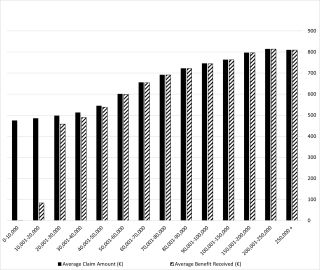Rent Tax Credit - Poorest Kept Furthest Behind

One of the new cost of living measures included in Government’s Budget 2023 was a Rent Tax Credit - available to tenants in the private rental sector in the form of an income tax refund. The €500 credit was introduced to ease the burden on tenants in the private rented sector who were not otherwise in receipt of housing subsidies.
While this measure was welcomed by many at the time, the reality for low-income renters, who arguably need this support more than most, is that they cannot access it as their incomes are too low to qualify. This anomaly exposes yet another Government policy which benefits higher earners at the cost of those on low incomes.
How does it work?
The Rent Tax Credit was outlined in brief in Budget 2023. The stated aim was to support taxpayers who are renting their principal private residence and who receive no other housing benefit from the State. The credit will be available for years 2022-2025 and further qualifying conditions were subsequently outlined by the Revenue Commissioners.
Although advertised as a €500 refund for all private rented sector tenants, the Rent Tax Credit is actually calculated as 20 per cent of annual rent payments, up to a maximum of €500. Tenants must also have a sufficient Income Tax liability against which to offset the credit in order to receive the full €500.
So, to qualify:
- Tenants must have paid at least €2,500 in rent in a given year and have an income tax liability of €500 or more after the usual employee tax credits (PAYE and Personal Tax Credits) have been applied to receive the full Rent Tax Credit.
- Proof of rent paid is based on having a tenancy which is registered with the Residential Tenancies Board (RTB).
- If the amount of the Rent Tax Credit exceeds the Income Tax liability of the tenant, the tenant can only receive a partial credit, up to the amount of their total Income Tax liability for the year.
In 2023, due to the difference in applicable rates of the National Minimum Wage (NMW), a 19 year old employee, working full-time worker on the NMW (€10.17 rate per hour for the age bracket) would qualify for the full €500 Rent Tax Credit on income tax grounds, while their 18 year old colleague working the same hours on the NMW (€9.04 per hour) would not. Nor would their part-time NMW colleagues.
Eligible married couples or civil partners can receive a total maximum credit of €1,000 in one year, but again this depends on their incomes in the previous tax year.
Applications and Awards - Distribution
According to the most recent preliminary PAYE Statistics (2023 Q1) relating to those who have claimed the Rent Tax Credit, it is clear that the impact of the credit has been unevenly distributed across the income distribution, with those on lower incomes missing out and higher earners gaining the most.
For those with gross earnings of €0-10,000, the Average Claim amount was €474, while the Average Benefit Received was just €1.
Those in the next income bracket (€10,001-20,000) had Average Claim Amount of €485, similar to the lowest earners, but an Average Benefit Received of €84, or 84 times the benefit received by those on the lowest incomes.
For employees earning between €20,000 and €30,000, the Average Claim Amount was, again, similar to the lower earners at €497, however the Average Benefit Received was closer to the full amount at €458.
As shown in Chart 1, the Average Benefit Received increases with increases in line with incomes.
Chart 1: Average Claim Amount and Average Benefit Received, by Income Bracket, Q1 2023

Source: Extracted from PAYE Statistics 2023 Q1 Returns, Revenue Commissioners
Note: The Revenue Commissioners do not provide a breakdown of claims made by tax unit type, so it is unclear how many of these claims were by individual people and how many have been made by couples who are jointly assessed.
Inherently Unfair
On the basis of the distribution of receipts alone, it is clear that the Rent Tax Credit is inherently unfair. However, there are other anomalies in the system:
- The capacity for a double payment of the Rent Tax Credit for those who are privately renting two homes (once the second home meets certain conditions) also highlights the nature of the measure as one under which those who have more, get more.
- The exclusion of tenants in receipt of HAP, regardless of what their own top-up to a private landlord might be, also means that many who are paying rents at the same rate as their peers in the private rental market are not in receipt of the Rental Tax Credit.
While the intention behind the Rent Tax Credit is welcome, the current application of the support excludes those most in need. This system means that those who are most impacted by the cost of living crisis (those on lower incomes) are not eligible for support provided (whether that be partial or full support) to soften the blow of the current crisis.
In our analysis of Budget 2023, we highlighted the regressive nature of many of the measures outlined, and the overall impact of the Budget as widening the rich-poor gap in Ireland. This measure, which is planned to continue to 2025 is also a regressive one and must be changed to meet its stated objectives.
Social Justice Ireland Policy Proposal
The current Rent Tax Credit excludes many low-income renters in the private rented sector. Social Justice Ireland believes all renters should receive renter-specific reliefs during a cost-of-living crisis, and propose that the support be redesigned and implemented as a universal grant to renters, which is excluded from tax, and is non-reckonable as income in applications to the Department of Social Protection and other sources of funding (such as SUSI) and could be modelled on the COVID-19 ‘Once off emergency grant’ allocated to students in December of 2020.
[1]https://www.gov.ie/en/press-release/d217e-minister-mcgrath-urges-renter…